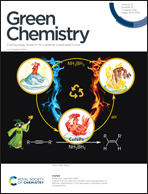An eco-friendly biomass pretreatment strategy utilizing reusable enzyme mimicking nanoparticles for lignin depolymerization and biofuel production†
Abstract
Pretreatment of lignocellulosic biomass to specifically depolymerise lignin moieties without the loss of carbohydrates as well as to minimize the generation of harmful intermediates during the process is a major challenge in the biofuel production process. In the present study, a nanoparticle mediated pretreatment strategy was developed to specifically depolymerise lignin from corn cob biomass. The synthesized nanoparticles possessed unique enzyme mimicking characteristics that can be exploited for the deconstruction of lignin moieties. The maximum delignification was 44% using cerium doped iron oxide nanoparticles within 24 h of incubation time, at 25 °C and a high solid loading of 20% (w/v). Gas chromatography-mass spectrometry study revealed the production of various lignin degraded compounds in pretreated liquids such as fatty acid methyl esters, which are the major components of fuel biodiesel. Aromatic alcohols and aldehydes were also observed during lignin degradation that has industrial importance. The remaining pretreated solid residues rich in carbohydrates can be further utilized in the generation of reducing sugars and in turn biofuels such as bioethanol, biobutanol, and biohydrogen. The value of the crystallinity index increased from 0.39 to 0.46 by delignification, indicating a total increase in biomass crystallinity. Moreover, the increase in biomass porosity indicates good biomass digestibility and in turn high reducing sugar yield. After enzymatic hydrolysis of 50 g L−1 pretreated biomass, 18.1 g L−1 of glucose and 9.12 g L−1 of xylose were released at 24 h, while the control (untreated biomass) showed a negligible amount of sugar release after hydrolysis. The recovery of nanoparticles after delignification was almost 50% of the initial concentration. The recovered catalyst was further recycled and reused, providing 37.1% delignification in the second run and 30.8% in the third run. Therefore, the obtained results in the current study substantiate the feasibility of the employed enzyme mimicking nanoparticles in the process of lignin degradation and fermentable sugar release in an eco-friendly manner.



 Please wait while we load your content...
Please wait while we load your content...